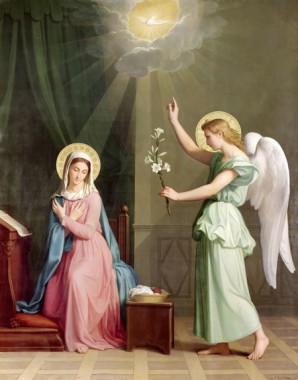On the Advent of Our Lord and Its Six Circumstances (Part III of III)
(from the Advent Homilies of Saint Bernard of Clairvaux, Doctor of the Church)
*
Advent’s Fifth and Sixth Circumstances
Editor’s Note: We began, in part one, to look at Advent’s first circumstance. In part II, we examined the second, third and fourth circumstances of Advent. Today, we’ll conclude our survey of the circumstances of Advent by exploring the fifth and sixth of Advent’s circumstances.
*
Circumstance 5: It is now fitting that we should consider the time of our Lord’s coming.
He came, as you know, not in the beginning, nor in the midst of time, but in the end of it. This was no unsuitable choice, but a truly wise dispensation of His infinite wisdom, that He might afford help when He saw it was most needed. Truly, “it was evening, and the day was far  spent” (Luke 24:29); the sun had well nigh set, and but a faint ray of his justice light and heat remained on earth. The light of Divine knowledge was very small, and as iniquity abounded, the fervour of charity had grown cold. No angel appeared, no prophet spoke. The angelic vision and the prophetic spirit alike had passed away, both hopelessly baffled by the exceeding obduracy and obstinacy of mankind. Then it was that the Son of God said “Behold, I come” (Hebrews 10:7). And “while all things were in quiet silence, and the night was in the midst of her course, the almighty word leaped down from heaven from thy royal throne” (Wisdom 18:14-15). Of this coming the Apostle speaks: “When the fullness of time was come, God sent his Son” (Galatians 4:4). The plenitude and affluence of things temporal had brought on the oblivion and penury of things eternal. Fitly, therefore, did the Eternal God come when things of time were reigning supreme. To pass over other points, such was the temporal peace at the birth of Christ that by the edict of one man the whole world was enrolled.
spent” (Luke 24:29); the sun had well nigh set, and but a faint ray of his justice light and heat remained on earth. The light of Divine knowledge was very small, and as iniquity abounded, the fervour of charity had grown cold. No angel appeared, no prophet spoke. The angelic vision and the prophetic spirit alike had passed away, both hopelessly baffled by the exceeding obduracy and obstinacy of mankind. Then it was that the Son of God said “Behold, I come” (Hebrews 10:7). And “while all things were in quiet silence, and the night was in the midst of her course, the almighty word leaped down from heaven from thy royal throne” (Wisdom 18:14-15). Of this coming the Apostle speaks: “When the fullness of time was come, God sent his Son” (Galatians 4:4). The plenitude and affluence of things temporal had brought on the oblivion and penury of things eternal. Fitly, therefore, did the Eternal God come when things of time were reigning supreme. To pass over other points, such was the temporal peace at the birth of Christ that by the edict of one man the whole world was enrolled.
You have now heard Who He is that comes, whence, whither, and to whom He comes; the cause, likewise, and the time of His coming are known to you.
Circumstance 6: One point is yet to be considered namely, the way by which He came.
This must be diligently examined, that we may, as is fitting, go forth to meet Him. As He once came visibly in the body to work our salvation in the midst of the earth, so does He come daily invisibly and in spirit to work the salvation of each individual soul; as it is written: “The Spirit before our face, Christ the Lord.” And that we might know this spiritual advent to be hidden, it is said: “Under his shadow we shall live among the Gentiles” (Lamentations 4:20). Wherefore, if the infirm cannot go far to meet this great Physician, it is at least becoming they should endeavour to raise their heads and lift themselves a little to greet their Saviour. For this, O man, you are not required to cross the sea, to penetrate the clouds, to scale the mountain-tops. No lofty way is set before you. Turn within thyself to meet thy God, for the Word is nigh in thy mouth and in thy heart. Meet Him by compunction of heart and by confession of mouth, or, at least, go forth from the corruption of a sinful conscience, for it is not becoming that the Author of purity should enter there.
It is delightful to contemplate the manner of His visible coming, for His “ways are beautiful, and all his paths are peace” (Proverbs 3:17). “Behold,” says the Spouse of the Canticles, he  cometh leaping upon the mountains, skipping upon the hills” (Song of Songs 2:8). You see Him coming, O beautiful one, but His previous lying down you could not see, for you said: “Shew me, O thou whom my soul loveth, where thou feedest, where thou liest” (Song of Songs 1:7). He lay feeding His angels in His endless eternity with the vision of His glorious, unchanging beauty. But know, O beautiful one, that that vision is become wonderful to thee ; it is high, and thou canst not reach it. Nevertheless, behold He hath gone forth from His holy place, and He that had lain feeding His angels hath undertaken to heal us. We shall see Him coming as our food, Whom we were not able to behold while He was feeding His angels in His repose. “Behold, he cometh leaping upon the mountains, skipping upon the hills.” The mountains and hills we may consider to be the Patriarchs and the Prophets, and we may see His leaping and
cometh leaping upon the mountains, skipping upon the hills” (Song of Songs 2:8). You see Him coming, O beautiful one, but His previous lying down you could not see, for you said: “Shew me, O thou whom my soul loveth, where thou feedest, where thou liest” (Song of Songs 1:7). He lay feeding His angels in His endless eternity with the vision of His glorious, unchanging beauty. But know, O beautiful one, that that vision is become wonderful to thee ; it is high, and thou canst not reach it. Nevertheless, behold He hath gone forth from His holy place, and He that had lain feeding His angels hath undertaken to heal us. We shall see Him coming as our food, Whom we were not able to behold while He was feeding His angels in His repose. “Behold, he cometh leaping upon the mountains, skipping upon the hills.” The mountains and hills we may consider to be the Patriarchs and the Prophets, and we may see His leaping and  skipping in the book of His genealogy. “Abraham begot Isaac, Isaac begot Jacob” (Matthew 1:2), etc. From the mountains came forth the root of Jesse, as you will find from the Prophet Isaiah: “There shall come forth a rod out of the root of Jesse, and a flower shall rise up out of his root, and the Spirit of the Lord shall rest upon him” (Isaiah 11:1-2a). The same prophet speaks yet more plainly: “Behold, a virgin shall conceive, and bear a Son, and his name shall be called Emmanuel, which is interpreted, ‘God with us’ ” (Isaiah 7:14). He Who is first styled a flower is afterwards called Emmanuel, and in the rod is named the virgin. But we must reserve for another day further consideration of this sublime mystery, as there is ample material for another sermon, especially as to-day’s has been rather long.
skipping in the book of His genealogy. “Abraham begot Isaac, Isaac begot Jacob” (Matthew 1:2), etc. From the mountains came forth the root of Jesse, as you will find from the Prophet Isaiah: “There shall come forth a rod out of the root of Jesse, and a flower shall rise up out of his root, and the Spirit of the Lord shall rest upon him” (Isaiah 11:1-2a). The same prophet speaks yet more plainly: “Behold, a virgin shall conceive, and bear a Son, and his name shall be called Emmanuel, which is interpreted, ‘God with us’ ” (Isaiah 7:14). He Who is first styled a flower is afterwards called Emmanuel, and in the rod is named the virgin. But we must reserve for another day further consideration of this sublime mystery, as there is ample material for another sermon, especially as to-day’s has been rather long.
*
Art: “Magic Tree” in the Cold Winter Night with Dark Blue Sky, epSos.de, 13 December 2012, CCA; Green hills, Jon Sullivan, 28 February 2013, PD-Worldwide; both Wikimedia Commons. The Annunciation, Auguste Pichon, 1859, Restored Traditions, used with permission.




